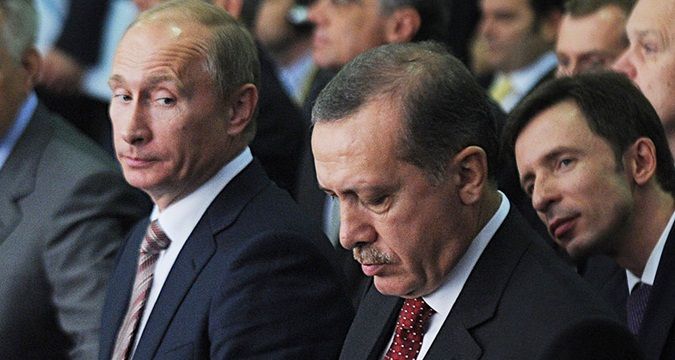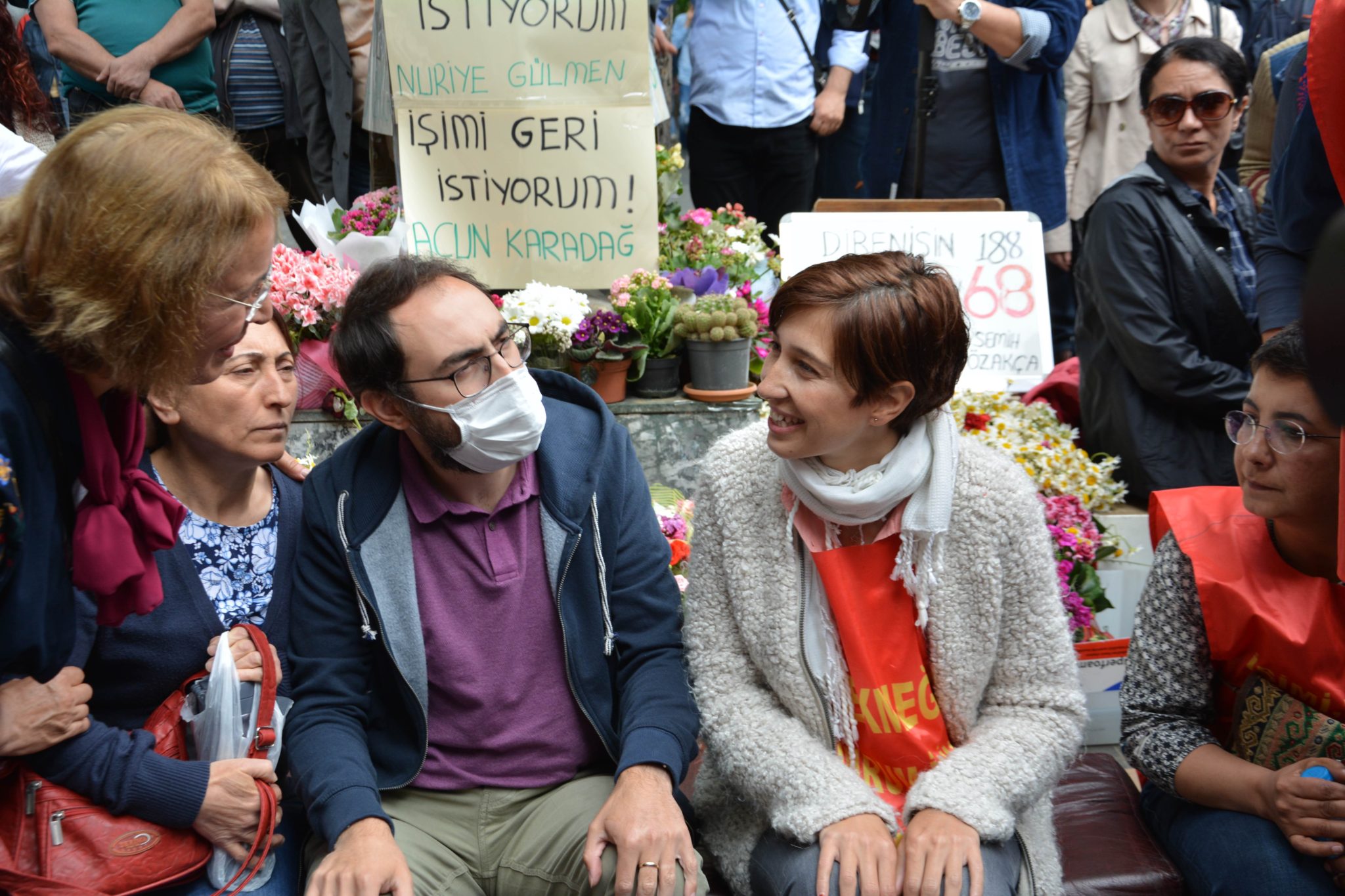By ALPER UZUN
Following the collapse of the Soviet Union, Turkey’s relationship with Russia has been economy-centred. However, in the recent years, interesting developments have resulted in major changes in the nature of the centuries-long relatonship between Turkey and Russia.
From the brink of war to brotherhood
Turkey downed a Russian jet on November 24, 2015. Erdogan’s presidential office, PM Davutoglu and the Turkish Army unanimously announced that the jet was downed by Turkish forces for violating the engagement rules. Later on, Davutoglu confirmed that he personally gave the order to hit the jet.
After the incident, Russia launched a campaign against Turkey including trade restrictions which were fatally damaging for Turkish economy and started to release news about Turkey’s relationships with ISIS in Syria. Russian generals even organized press conferences to inform the international community about Turkish trucks transporting ISIS’s oil. Russia lodged complaint before the UN Security Council and these files are still awaiting to be taken into consideration. Also Russia threatened Turkey to bring up the issue in the UN General Assembly.
Subsequently, Erdogan forced Davutoglu who publicly declared that he had given the order to hit the Russian jet to step down. He resigned despite he had won a big victory in the elections only six months ago. It is still controversial whether Davutoglu was forced to resign because of the “Transparency Bill” that he tried to pass in the parliament. After that, Erdogan apologized to Russia for downing the jet and started to become closer to Russia while making clear that he doesn’t care about the EU membership process anymore.
Obviously Putin was convinced that Erdogan had learnt his lesson and gave up on voicing the Erdogan-ISIS allegations after Davutoglu’s resignation and Erdogan’s apology. Since then Turkish-Russian relations have been developing in many fields contrary to Turkey’s constantly deteriorating relations with Western democracies.
Under the banner of normalization of diplomatic relations, Moscow has lifted some of its sanctions to Turkey and opened a manevouring field to Ankara in Syria.
Erdogan’s bluff
Last week, Erdogan declared that Turkey has signed a deal to buy Russian S-400 Air Defense System. In his response to criticisms, “Nobody has the right to discuss the Turkish Republic’s independence principles or independent decisions about its defense industry” said Erdogan. Being devoted his last one and a half year to destroy the country’s army and undermine the country’s national security, Erdogan’s emphasis on national defense and defense industry is at best misguiding. Let alone an air defense system, by virtue of Erdogan’s purges, there is shortage of pilot in Turkish Air Forces to fly F-16s.
Although the US and the EU are well aware of Erdogan’s increasing closeness with Russia, the latest S-400 agreement between Ankara and Moscow has been drawing a special attention for quite some time. As a building block of Turkey’s relations with the West, defense and security cooperation has a special importance. In this respect, Erdogan’s decision to buy a Russian air defense system has a symbolic meaning more than Turkey’s national security necessities.
Erdogan’s message to the US and the EU is pretty clear: “If you do not embrace me as one of your Middle Eastern partner by ignoring my authoritarianism and relations with different terrorist organizations, I will find a safe harbour in Moscow.”
Realizing growing threat perception of Russia in the Western public opinion, he believes that the US and the EU are in need of Turkey because of its strategic importance and unique geopolitical position, therefore, they will come to the terms of him by simply accepting the situation in Turkey as a fait accompli.
In fact, Erdogan has been sending strong signals that he is ready to line up behind Putin or even take place in Shanghai Cooperation Organization, a.k.a. the Shanghai Five which will not bother Erdogan with democratic principles and protecting fundamental rights. He was not happy with Europe’s pressure over certain issues such as the rule of law, human rights, media freedom and his increasing authoritarianizm.
However, Erdogan’s hand is not so strong as he imagines. His bluff has two significant flaws. First, being a dictatorship with ambiguous ties with some radical groups in the Middle East negates the importance of Turkey’s strategic value as a partner. As a country which lost its all qualified cadres in military and in other state institutions, Turkish state has been experiencing an enormous degenaration.
Most of the military personnel who facilitates coordination between the Turkish Army and NATO has been purged and placed under arrest. Following the purge of these western-minded officers, the ones, who are closed to Russophile Eurasianist Dogu Perincek’s group, have been in charge of coordinating Turkish army’s cooperation with the Alliance. It is obvious that Turkish military under the influence of Perincek group seems like a rouge partner rather than a reliable ally.
Erdogan’s relations with radical jihadist groups, some of which are recognized as terrorist organizations in Western countries, raise question marks. Under his governance, Turkey has turned to be a nest for radical groups. Turkey’s strategy of exploiting its unique geopolitical position in allowing foreign terrorist fighters to cross into Syria and Iraq is considered an important threat in the European media and in the Western public opinion. The terrorists use Turkey as a two-way road. They do not only go to Syria and Iraq, they also return to Europe with the fighting experienced they gained in the field. So, Erdogan’s blind eye policy towards radical groups for the sake of his ambitious goals has devastating consequences for international security.
It is true that refugees which exceed two millions are the most powerfull weapon in Erdogan’s hand against the EU. He made clear that he will hold them out of EU’s borders as long as the EU turns blind eye to his anti-democratic practices. Nevertheless, European leaders believe that they have left behind the hardest days in the refugee crisis. Together with the increasing stability in Syria, Erdogan has been losing its refugee card too.
In addition to technical and strategic matters of integrating a non-NATO system into NATO system, traditional Turkish-Russian rivalry is another problem in Erdogan’s S-400 bluff to the West. Normally, Russia threat had always been a driving force of Turkey’s western oriented foreign policy. Especially during the Cold War, NATO membership protected the country from Soviet expansionism.
Although there is no more the Cold War and the Soviets, the rules of the game between Ankara and Moscow did not change too much. Against the Russian aggresiveness in Ukraine, Georgia, and Syria, Turkey’s only reliable allies are the US and the EU.
Erdogan’s Selfishness
All these developments between Russia and Turkey suggest that in recent years, especially after the corruption investigations of 17-25 December that Erdogan’s son and his cabinet members involved, nature of the Turkey-Russia relations has changed.
Erdogan has made Putin and his proxies in Turkey his ally against pro-Western factions within the bureaucracy and the army. Obviously, the botched coup attempt provided the opportunity for the anti-West groups to overtake the state institutions.
Throughout decades, in line with the objectives set out by the founder of the Republic Ataturk, Turkish politicians and diplomats made enormous efforts to be a member of the EU and to take place among other Western democracies. Back in the days of the Korean War, thousands of Turkish soldiers gave their lives to prove Turkey’s value in defence of democracy and the free world. Turkey’s membership to NATO became possible only after this sacrifice. Yet today, Erdogan has been wasting all this efforts and sacrifices at once to save his own political carreer.



